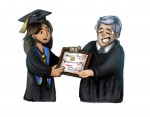BHARIL: Honor: It’s something many people value and aspire to attain in their lives; however, when it comes to the College Honors program at UCLA, it seems to be the opposite. Many students know very little about this program, and even less on why they should enroll in it. But that might change. The Honors program is cooking up a new committee made up of faculty and students. They hope it’ll make the program more accessible to potential enrollees.
Meet Diane Dilal, a fourth-year psychology student who is currently enrolled in the Honors program. For her, the Honors program has been very helpful.
DILAL: They allow you to do research and use the units that you are getting from your research courses and apply them to College Honors, so I’ve never had to take an honors class, specifically.
BHARIL: Many of the classes Dilal takes, like her Student Research Program credit for research, overlap with honor class units. It makes the honors requirements easy to finish. Dilal says she’s never taken a bona fide honors class, just a class to fulfill a requirement. She’s completed the entire program.
The Honors program helps in other ways, especially for students who are trying to double major.
DEY: My name is Ipsita Dey, I’m a 3rd year at UCLA and I’m a double major in anthropology and microbiology, immunology and molecular genetics.
Because I’m a double major I have to take multiple classes in a quarter, sometimes more than five, and for that I have to extend my unit max to mostly 23 units a quarter, and going through Honors makes that process so much easier, my petition goes through in seconds … it just makes my life easier as a double major (5 min)
BHARIL: But where some students see a convenient way to enroll in classes, Dilal still sees room for improvement.
DILAL: The Honors collegium classes aren’t the most interesting, they tend to focus on history or science and I think that’s about it at least from what I’ve seen so a wider array of courses could incentivise people to join.
DEY: One thing I would suggest is that the Honors program really advertises its resources. So definitely the honors program could improve on their outreach.
BHARIL: But as an honors student, Dey already enjoys a few perks, like special scholarships, easier access to counselors, faster paperwork processing and extra study abroad opportunities.
But other students, like Manjeri Daniel a second-year neuroscience student, just want to feel a little less intimidated by the experience.
DANIEL: I feel like if people know more and how to stay on top of units and how to complete the program then they’ll be less intimidated by it and more likely to use the resources they can have through the program. (2:05) So greater communication I think would really help a lot.
BHARIL: The good news? Honors students believe that student participation on the faculty advisory committee will help the program.
DEY: I think having a student perspective within the Honors program and helping the people who provide the resources to the students needs and wants. I think that’s great and that’ll only add to the experience of honors students that are participating in the Honors College program.
DANIEL: I do think it’s a good idea because I think college counseling in general can just be improved upon in general, especially at UCLA since there are so many students … The student body itself has a lot to bring to college counseling and a lot to offer as far as like we know what we need so that might help to pinpoint the needs of our student body.
BHARIL: The committee has high expectations. Hopefully it will help the Honors program meet the needs of UCLA students. And who knows, maybe next time you’re on Bruin Walk you’ll get a flyer for the program.
For the Daily Bruin, this is Sarika Bharil.

I actually think the CHP is pretty kickass. Courses earning honors credit are usually better than others, particularly collegium courses which give professors wide latitude in terms of creativity. Also, in general, working one-on-one with professors is encouraged and rewarded. And having a dedicated counseling unit is also very helpful, with the staff treating you professionally and not like you’re an idiot.
The variety of preferences given to active participants in the program makes it worth it.
As for people who become sad that they took too long to navigate, let alone find, the program, I’m not very sympathetic. If you want the perks of being in the CHP, if you want preferred opportunities, then you need to figure out how to excel at the outset of your time at UCLA. Read the flyers, people.